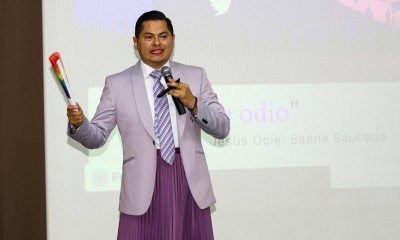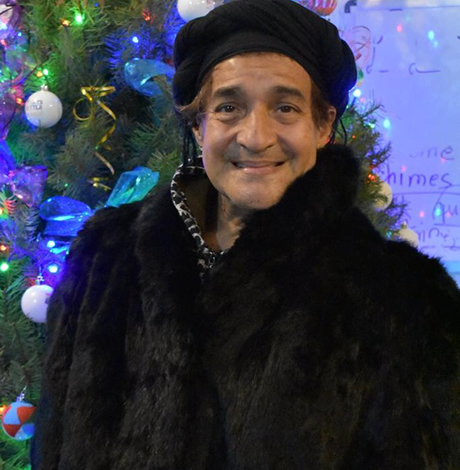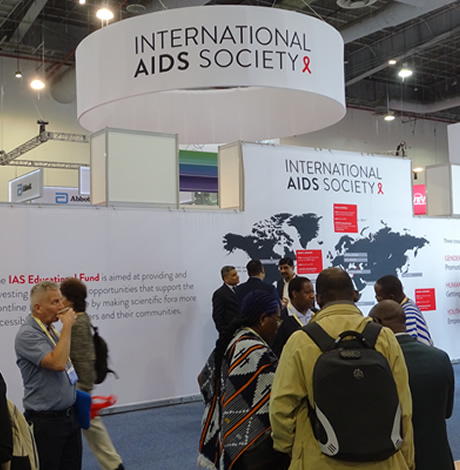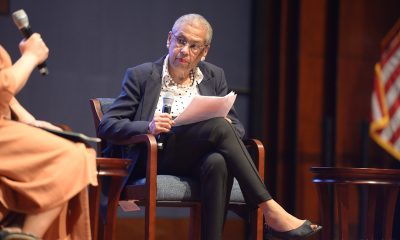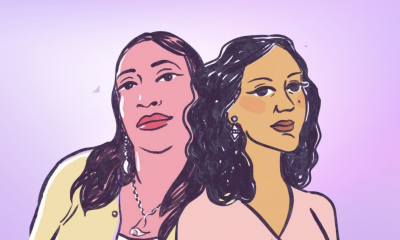World
Mexico City shelter offers second chance for transgender residents
Casa Refugio Paola Buenrostro named after murdered trans sex worker
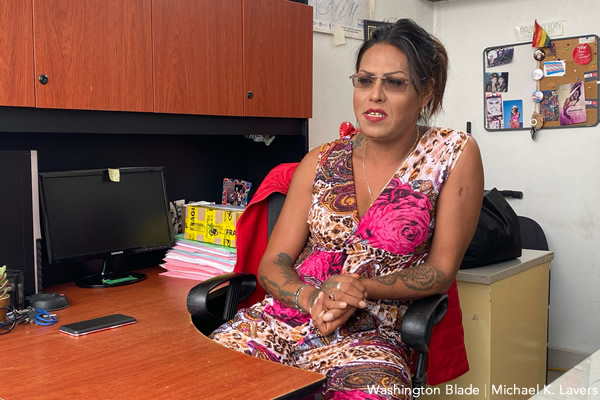
MEXICO CITY — Alcohol and drugs were the only things that allowed Michel Ríos, 33, to cope with her fears and traumas when she engaged in sex work or tried to face her life as a person with a disability.
Ríos is a transgender woman from Mexico’s Veracruz state who lost one of her legs when she was seven and earned her family’s contempt from the moment she assumed a non-heteronormative sexual orientation and gender identity. Ríos was forced to leave home at 15 and began to earn a living on the streets, alone.
She began to seek help after several years.
Ríos found Casa Refugio Paola Buenrostro, a shelter in Mexico City that Casa de las Muñecas Tiresias, a local advocacy group, runs. She first arrived with the intention of becoming sober through an Alcoholics Anonymous program, but she ended up staying to rebuild her life.
Shelter named in honor of murdered trans sex worker
Kenia Cuevas, a renowned LGBTQ rights activist, founded Casa de las Muñecas after she witnessed the murder of her best friend, Paola Buenrostro, in December 2016 while they were both engaged in sex work. That tragic event was the final straw that motivated her to fight for her community.
Casa Refugio Paola Buenrostro opened its doors in January 2020.
“The mission of our organization is that those people who we welcome know their rights, that they can have a decent life, that they can understand life processes and we can rescue them from situations of vulnerability, of abandonment, when they believe that everything has been lost,” said Cuevas during an exclusive interview with the Washington Blade via Zoom.
International News Editor Michael K. Lavers visited the shelter on Saturday and met with Cuevas.
“In short, what we do is create living conditions in accordance with human rights,” said Cuevas. “We have managed to give visibility to all the problems that trans people face on a day-to-day basis and of which society was not aware.”
Casa de las Muñecas has offices in Mexico City and in Mexico, Nayarit, Morelos and Guerrero states. It has a team of professionals who carry out a variety of services for trans people that includes support for legally changing their identity, legal advice and education workshops.
“We are also entering prisons to provide legal literacy to transgender people, workshops on culture, sports, addictions,” said Cuevas. “When they are released we then rescue them and take them to the home to continue their social reintegration.”
Casa de las Muñecas’ Mexico City shelter is named in honor of Buenrostro. Casa de las Muñecas also plans to open two additional shelters — one in the Mexican capital and another in Mexico state.
Casa de las Muñecas served 1,800 people in its first year of operation, which was 2018. The organization, according to Cuevas, had worked with upwards of 10,000 people last year.
Ríos arrived in July 2020 amid the pandemic. She said the shelter and its residents are now her family, because she has not seen her biological relatives since 2007.
“It is my home, a refuge from discrimination, violence, prostitution, drugs and alcohol,” Ríos told the Blade. “Staying here gives people the opportunity to grow, to achieve their dreams. It tells you that you can still dream. I am 41-years-old and I am dreaming. I am learning to dream here. The house has opened my horizons, it has given me the opportunity to be a different person.”
Ríos’ goal at the shelter is to learn the skills that will allow her to reintegrate into society. Ríos said she also hopes to help other people who may be in the same situation in which she was before she arrived.
“My goal is to finish my ‘prepa’ (high school diploma) and make a career for myself,” said Ríos, who hopes to become a designer.
This educational preparation is part of an intervention strategy that Casa de las Muñecas created in July 2020 to eliminate education disparities among the trans community.
“We do workshops aimed at economic autonomy, connecting them to the labor force,” said Cuevas. “It also allows for psychological support, access to health care, treatment for HIV or hormones, as well as the right to identity, either in their documents or the change of identity.”
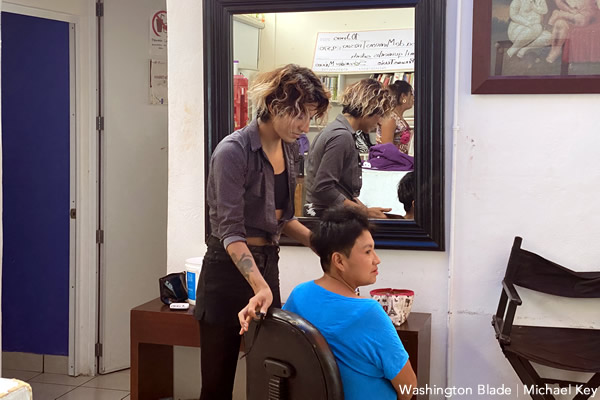
Victoria Alejandra Arias, 33, a trans woman who is also from Veracruz state, learned while at the shelter that she is living with HIV. She was diagnosed at the shelter and now receives treatment.
Arias abused alcohol and drugs and was a sex worker.
She said her now ex-partner physically and emotionally abused her. He threatened and blackmailed Arias before they finally ended up in jail.
Arias recalled she was in a desperate physical and mental state when a friend brought her to the shelter on Jan. 7. She has found purpose in her life after less than five months.
“We have several workshops here, we go out to do exercises,” Arias told the Blade. “My life has changed in every way. I have improved in the physical sense because I got too thin. I used crack, a very addictive drug, and it really destroys people. My appearance is improving little by little. I know that I am on my way.”
“Women already have a profession because of all this support,” added Cuevas. “It will be easier for them to integrate themselves into society because they can come out (of here) a little more educated, empowered and know their rights and responsibilities.”
More than 20 people were living in the shelter when Cuevas spoke with the Blade, with 50 names on a waiting list. Canela and Leslie, two rescue dogs, also live at the shelter.
The Mexico City government pays the shelter’s rent and utilities, but donations that mostly come through social networks and people who provide furniture and other items support it. Cuevas donates around 70 percent of her salary.
“Our day at the house starts at 6 in the morning,” said Arias. “We make the bed, we bathe, we put on makeup and we go to our workshops, because part of this place’s goal is to re-educate ourselves.”
Ríos told the Blade the shelter offers English, theater, cosmetology, mathematics, Spanish, science and acting workshops.
“I’ve already imitated Paquita la del Barrio because I look a lot like her physically,” she said. “My favorite workshop is the theater — especially comedy — one because it goes great with my personality. The experience of acting is very beautiful. I have a lot of fun.”
Ríos said she and other workshop participants are preparing to premiere a play in December. She told the Blade they also perform at street festivals and in prisons.
Cuevas said she wants to open a headquarters for Casa de las Muñecas and a shelter in each of Mexico’s 32 states. Cuevas added she would like to expand her work throughout the rest of Latin America.
She said her greatest achievement is the gratitude and happy faces of those who have passed through the shelter.
“Thanks to this place I have regained my dignity,” said Ríos. “I want to live and, despite my disability and all the physical problems, I don’t let myself be defeated and I keep going.”
Arias, meanwhile, hopes to become a stylist “because I want to have a job.”
“I would like to finish my studies,” she said. “I see all those goals closer and stronger now and all that is for my life here. My greatest success is being clean and having goals in my life.”

Advocacy groups are demanding the Trump-Vance administration not to deport two gay men to Iran.
MS Now on Jan. 23 reported the two men are among the 40 Iranian nationals who the White House plans to deport.
Iran is among the countries in which consensual same-sex sexual relations remain punishable by death.
The Washington Blade earlier this month reported LGBTQ Iranians have joined anti-government protests that broke out across the country on Dec. 28. Human rights groups say the Iranian government has killed thousands of people since the demonstrations began.
Rebekah Wolf of the American Immigration Council, which represents the two men, told MS Now her clients were scheduled to be on a deportation flight on Jan. 25. A Human Rights Campaign spokesperson on Tuesday told the Blade that one of the men “was able to obtain a temporary stay of removal from the” 10th U.S. Circuit Court of Appeals, and the other “is facing delayed deportation as the result of a measles outbreak at the facility where they’re being held.”
“My (organization, the American Immigration Council) represents those two gay men,” said American Immigration Council Senior Fellow Aaron Reichlin-Melnick in a Jan. 23 post on his Bluesky account. “They had been arrested on charges of sodomy by Iranian moral police, and fled the country seeking asylum. They face the death penalty if returned, yet the Trump (administration) denied their asylum claims in a kangaroo court process.”
“They are terrified,” added Reichlin-Melnick.
My org @immcouncil.org represents those two gay men. They had been arrested on charges of sodomy by Iranian moral police, and fled the country seeking asylum. They face the death penalty if returned, yet the Trump admin denied their asylum claims in a kangaroo court process.
They are terrified.
— Aaron Reichlin-Melnick (@reichlinmelnick.bsky.social) January 23, 2026 at 8:26 AM
Reichlin-Melnick in a second Bluesky post said “deporting people to Iran right now, as body bags line the street, is an immoral, inhumane, and unjust act.”
“That ICE is still considering carrying out the flight this weekend is a sign of an agency and an administration totally divorced from basic human rights,” he added.
Deporting people to Iran right now, as body bags line the street, is an immoral, inhumane, and unjust act. That ICE is still considering carrying out the flight this weekend is a sign of an agency and an administration totally divorced from basic human rights. www.ms.now/news/trump-d…
— Aaron Reichlin-Melnick (@reichlinmelnick.bsky.social) January 23, 2026 at 8:27 AM
HRC Vice President of Government Affairs David Stacy in a statement to the Blade noted Iran “is one of 12 nations that still execute queer people, and we continue to fear for their safety.” Stacy also referenced Renee Good, a 37-year-old lesbian woman who a U.S. Immigration and Customs Enforcement agent shot and killed in Minneapolis on Jan. 7, and Andry Hernández Romero, a gay Venezuelan asylum seeker who the Trump-Vance administration “forcibly disappeared” to El Salvador last year.
“This out-of-control administration continues to target immigrants and terrorize our communities,” said Stacy. “That same cruelty murdered Renee Nicole Good and imprisoned Andry Hernández Romero. We stand with the American Immigration Council and demand that these men receive the due process they deserve. Congress must refuse to fund this outrage and stand against the administration’s shameless dismissal of our constitutional rights.”
Central America
Dignidad para vidas LGBTQ en Centroamérica
Embajada canadiense en El Salvador se presentó ‘Historias de vida desde los cuerpos y territorios de la disidencia LGBTIQ+’
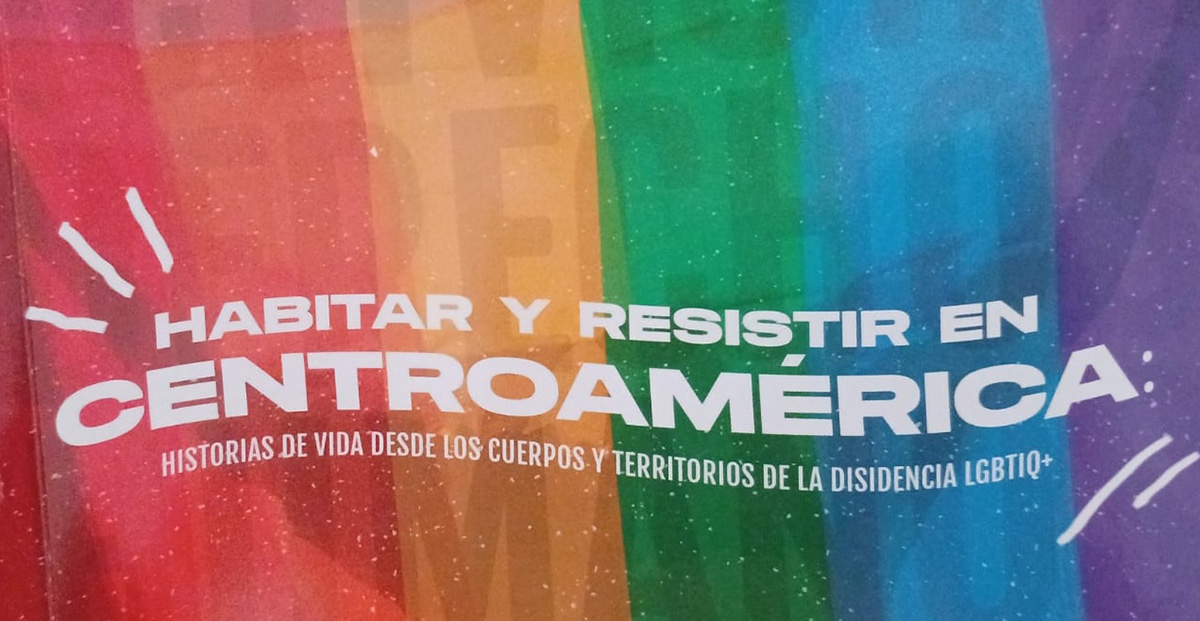
SAN SALVADOR, El Salvador — “A los 16 años, mi papá me echó”. Esa frase directa, sin adornos ni concesiones, es parte de una de las historias más impactantes del libro “Historias de vida desde los cuerpos y territorios de la disidencia LGBTIQ+”, presentado el 23 de enero. El testimonio pertenece a Estrella Cerón, mujer trans salvadoreña, cuya vida quedó marcada por la expulsión familiar y la violencia cotidiana ejercida contra su identidad.
Estrella relata que fue descubierta abrazando a un muchacho en la panadería que pertenecía a su familia, lugar donde también trabajaba. La respuesta fue inmediata: no le permitieron cambiarse de ropa ni llevar sus pertenencias. Salió “sucia, con olor a grasa, sin zapatos”. Su padre lloró al verla irse, pero no la detuvo. “Así ándate”, le dijo. Ese episodio no solo marcó su historia personal, sino que hoy se convierte en un reflejo de una realidad compartida por muchas personas trans en El Salvador y la región.
Durante la presentación del libro, Cerón tomó la palabra y compartió lo que significó volver a su historia frente a otras personas. Reconoció que no fue un proceso sencillo, pues implicó enfrentarse a recuerdos profundamente dolorosos.
“Fue doloroso hablarlo, sentí como un muro que fui rompiendo a poco a poco, saliendo adelante y pues hasta el día de hoy me siento más empoderada y más fuerte”, expresó. Sus palabras resonaron entre las y los asistentes, evidenciando que narrar la propia vida puede convertirse en un acto de sanación y afirmación personal.
Este momento público subrayó uno de los ejes centrales del proyecto: el derecho de las personas LGBTQ a contar sus historias en sus propios términos, sin miedo y con dignidad.
Rostros de la Equidad: un proyecto regional de memoria y justicia
La presentación de las publicaciones se realizó en el marco del proyecto Rostros de la Equidad, impulsado por COMCAVIS TRANS, con el apoyo de OIKOS y la Embajada de Canadá en El Salvador. El evento reunió a activistas, representantes de organizaciones sociales, cooperación internacional y público en general.
Como parte de este proyecto se presentaron dos materiales: el libro “Historias de vida desde los cuerpos y territorios de la disidencia LGBTIQ+” y el glosario vivencial y de conceptos sobre la diversidad sexual y de género. Ambos productos buscan aportar a la visibilización, sensibilización y defensa de los derechos humanos de las personas LGBTQ en Centroamérica.
El proyecto se concibió como un proceso colectivo, regional y participativo, en el que las voces protagonistas fueran las de quienes históricamente han sido marginadas.
El libro de historias de vida se distancia de la lógica del simple recopilatorio de testimonios. Tal como lo expresa su prólogo, se trata de “un acto de memoria, reparación, justicia personal y colectiva”. Su objetivo es mostrar voces que han resistido al silencio y al miedo, y que hoy deciden narrar sus verdades.
Las historias incluidas atraviesan experiencias de expulsión familiar, discriminación, violencia institucional, migración forzada y exclusión social. Sin embargo, también dan cuenta de procesos de resistencia, organización comunitaria, reconstrucción personal y esperanza.
En ese equilibrio entre dolor y dignidad, el libro se convierte en una herramienta política y pedagógica que interpela a la sociedad y a las instituciones.
Junto al libro se presentó el glosario vivencial y de conceptos sobre la diversidad sexual y de género, una propuesta que busca ir más allá de las definiciones tradicionales. El glosario no se limita a explicar términos, sino que los conecta con experiencias reales de personas LGBTQ.
Cada concepto está atravesado por el derecho a la identidad, el reconocimiento y la dignidad. De esta forma, las palabras dejan de ser etiquetas para convertirse en relatos vivos que reflejan cuerpos, territorios e historias concretas.
Las organizaciones impulsoras señalaron que el glosario pretende ser una herramienta accesible para procesos formativos, educativos y comunitarios, aportando a una comprensión más humana de la diversidad sexual y de género.
El respaldo internacional y el valor de la resistencia
Durante la presentación, la embajadora de Canadá en El Salvador, Mylène Paradis, reconoció el trabajo de COMCAVIS TRANS, OIKOS y de todas las personas que hicieron posible Rostros de la Equidad.
“Las historias de vida reunidas en este libro nos recuerdan que resistir no es solo sobrevivir, sino también afirmar la propia existencia, reclamar derechos y construir esperanza incluso en contextos adversos”, afirmó Paradis, destacando la importancia de apoyar iniciativas que promueven la justicia social y los derechos humanos.
Su intervención subrayó el valor político de la memoria y el papel de la cooperación internacional en el acompañamiento de procesos liderados por organizaciones locales.
Un proceso regional de escucha y construcción colectiva
El libro y el glosario son el resultado de una consulta a 10 personas LGBTQ: cuatro de Guatemala, dos de El Salvador y cuatro de Honduras. Además, se realizaron grupos focales en cada uno de estos países para profundizar en las experiencias compartidas.
El proceso inició en agosto de 2024 y concluyó con la presentación pública de los resultados en enero de 2026. Para las organizaciones participantes, este trabajo evidenció la necesidad de generar espacios seguros de escucha y diálogo en la región.
La dimensión regional del proyecto permite identificar patrones comunes de violencia, pero también estrategias compartidas de resistencia y organización.
Georgina Olmedo, encargada del área de formación y nuevos liderazgos de COMCAVIS TRANS El Salvador, destacó que el libro busca reconocer las historias que atraviesan las personas LGBTQ.
“Son historias marcadas por la resistencia, la dignidad, el aprendizaje y toda la esperanza”, señaló, subrayando que muchas de estas vivencias continúan siendo invisibilizadas en el discurso público.
Para Olmedo, visibilizar estas narrativas es un paso necesario para transformar las realidades de exclusión y violencia que enfrenta esta población.
Escuchar sin juzgar: el valor del acompañamiento
Desde OIKOS, Jason García resaltó que el libro incluye voces de Guatemala y Honduras, lo que le otorga un carácter regional. Señaló que fue un honor conocer historias de personas que se atrevieron a contar lo que nunca antes habían contado.
García explicó que muchas de las personas participantes expresaron estar cansadas de ocultar quiénes son y que, durante el proceso, encontraron por primera vez espacios donde fueron escuchadas sin ser juzgadas.
“Cada historia que se comparte es un recordatorio de que ninguna violencia puede apagar la dignidad de una persona”, afirmó, destacando los procesos de sanación y reconstrucción que emergen incluso en contextos adversos.
Marielos Handal, integrante del equipo de OIKOS que acompañó la investigación, compartió una reflexión sobre los retos que implicó construir estas publicaciones. Las entrevistas, explicó, dejaron nudos en la garganta, silencios densos y muchas preguntas abiertas.
Entre ellas, cómo continuar escribiendo después de escuchar relatos de abandono, rechazo y violencia sistemática; cómo narrar sin revictimizar, sin simplificar ni maquillar la verdad, pero tampoco explotarla.
Estas preguntas atravesaron todo el proceso editorial, marcando el cuidado con el que se construyeron tanto el libro como el glosario, priorizando siempre la dignidad de las personas participantes.
Palabras que se convierten en dignidad colectiva
La presentación cerró con un llamado a leer estas publicaciones no desde la lástima, sino desde la responsabilidad colectiva de reconocer las deudas históricas con las personas LGBTQ en Centroamérica.
Historias de vida desde los cuerpos y territorios de la disidencia LGBTQ y su glosario vivencial se consolidan como documentos necesarios en un contexto marcado por la exclusión, pero también por la lucha, la memoria y la esperanza.
En cada relato, como el de Cerón, queda claro que narrar la propia historia es un acto profundamente político: contar lo vivido no borra el dolor, pero lo transforma en palabra, memoria y dignidad compartida.
Russia
Russia designates ILGA World an ‘undesirable’ group
Justice Ministry announced designation on Jan. 21
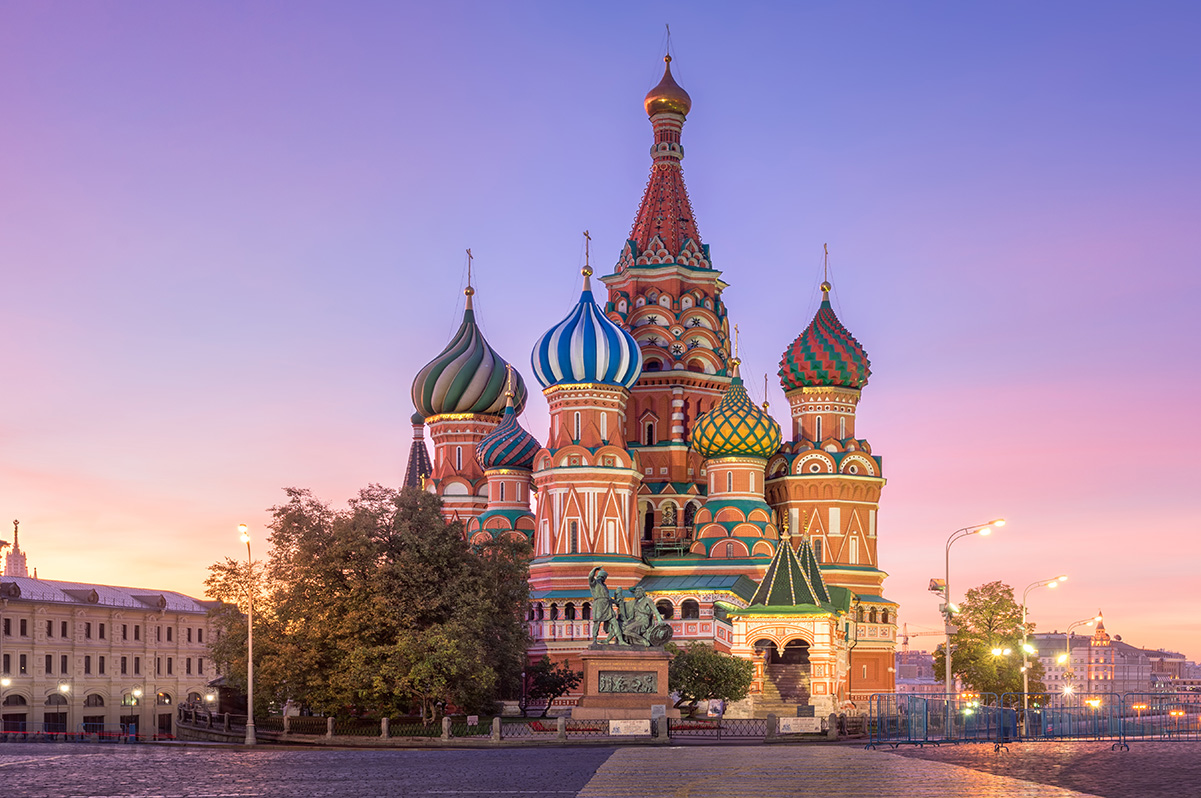
Russia has designated a global LGBTQ and intersex rights group as an “undesirable” organization.
ILGA World in a press release notes the country’s Justice Ministry announced the designation on its website on Jan. 21.
The ministry’s website on Tuesday appeared to be down when the Washington Blade tried to access it. ILGA World in its press release said the designation — “which also reportedly includes eight other organizations from the United States and across Europe” — “has been confirmed by independent sources.”
“ILGA World received no direct communication of the designation, whose official reasons are not known,” said ILGA World.
The Kremlin over the last decade has faced global criticism over its crackdown on LGBTQ rights.
ILGA World notes Russians found guilty of engaging with “undesirable” groups could face up to six years in prison. The Russian Supreme Court in 2023 ruled the “international LGBT movement” is an extremist organization and banned it.
“Designating human rights groups ‘undesirable’ is outlandish and cynical, yet here we are,” said ILGA World Executive Director Julia Ehrt. “But no matter how much governments will try to legislate LGBTI people out of existence, movements will stay strong and committed, and solidarity remains alive across borders. And together, we will continue building a more just world for everyone.”
-

 Real Estate4 days ago
Real Estate4 days agoConvert rent check into an automatic investment, Marjorie!
-

 Theater4 days ago
Theater4 days agoSwing actor Thomas Netter covers five principal parts in ‘Clue’
-

 District of Columbia4 days ago
District of Columbia4 days agoEleanor Holmes Norton ends 2026 reelection campaign
-

 Honduras3 days ago
Honduras3 days agoCorte IDH reconoce a Thalía Rodríguez como familia social de Leonela Zelaya

